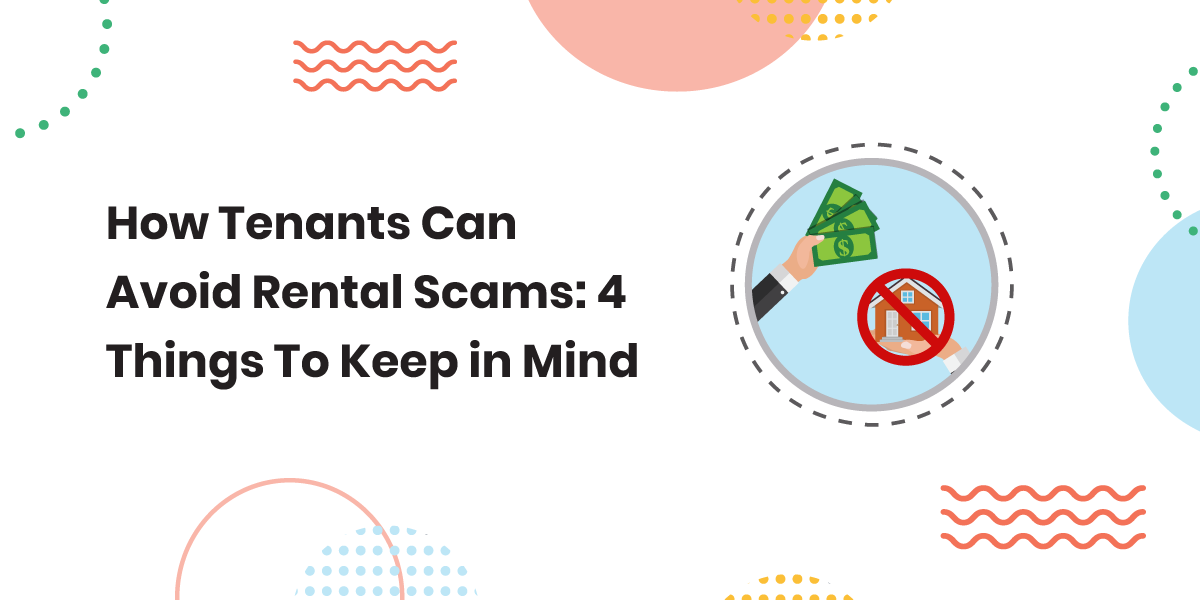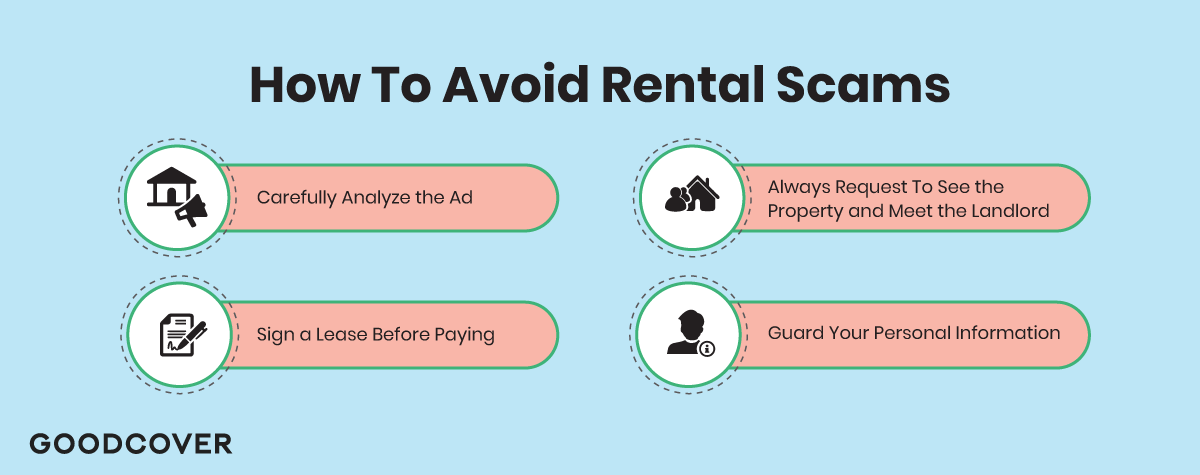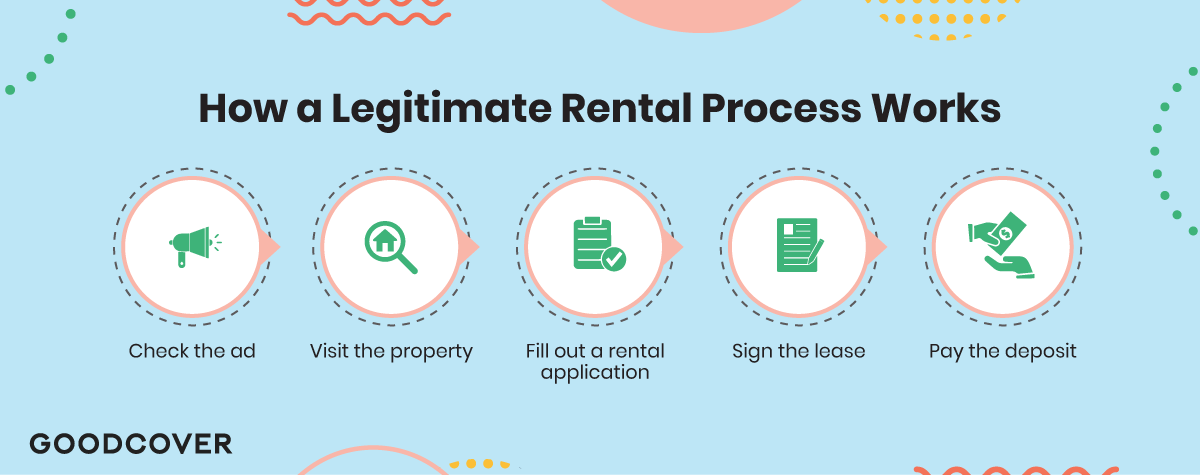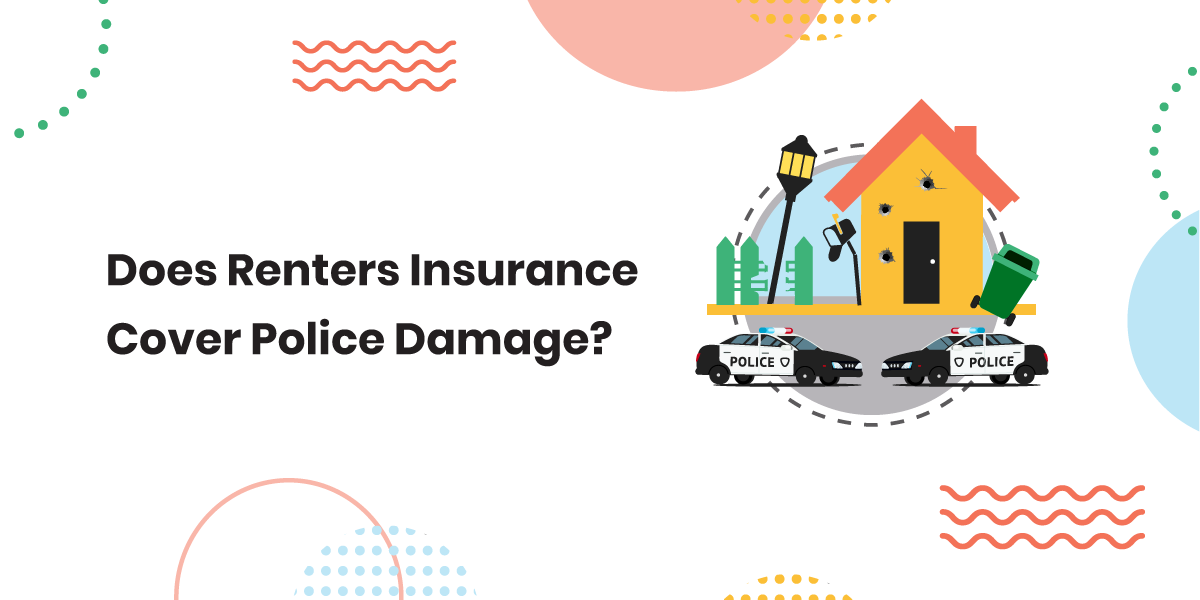How Tenants Can Avoid Rental Scams: 4 Things To Keep in Mind
21 Apr 2023 • 6 min read

Renting is often a smarter move than buying a home, and finding a safe and affordable place to rent is essential. But the prevalence of shady rental scams can make searching for a new place daunting.
Scammers are stealing from renters more than ever, thanks to online platforms like Craigslist, so it's good to know how to protect yourself. According to the FBI, real estate and rental scammers stole over $350 million in 2021 alone.
In this post, we'll show you how to identify common rental scams and red flags so that you can avoid becoming a victim of fraud or theft. Let's jump in:
- What Are The Most Common Rental Scams
- How To Avoid Rental Scams
- How a Legitimate Rental Process Works
- Be a Diligent Tenant
The Most Common Rental Scams
The rental scams that most often dupe renters typically fall under two categories: hijacked ads and phantom listings. These ads aim to collect rent or fees from you with no intention to ever rent the property to you.
The goal is the same for every scam — steal money from you. Scammers target you to steal money through credit checks, deposits, rent payments, and your personal information to fuel identity theft. And they all start with promising the dream of safe and affordable housing through malicious ads.
Hijacked Ads
Hijacked ads are rental listings that scammers copy from an actual ad. They change a few details and add their phone number and email, so all leads are diverted to the scammer instead of the true owner. This scam usually attempts to get a credit check fee or a deposit on a home, even though the scammer has zero authority — or intention — to actually rent you the place.
Phantom Ads
Phantom ads are fake listings created by scammers for properties not currently for rent. They grab photos from Google or social media and create a completely fictional listing.
When you make contact with the person from the listing, they typically share a hardship story to explain why the rent is too good to be true for a place with great amenities. Like hijacked ads, this type of listing aims to steal money from you, then disappear and never rent out the home. They'll continue to do this, over and over, collecting money until they get caught.
How To Avoid Rental Scams

Here are ways to protect yourself against scammers when browsing through rental listings:
1. Carefully Analyze the Ad
One of the best ways to distinguish scammers from genuine landlords online is to carefully review the listing. Some signs are obvious. For instance, the Federal Trade Commission (FTC) says an abnormally low rent price is a red flag.
To make yourself even more confident, search for the individual or real estate company that posted the rental ad online. Legitimate landlords generally have a professional website or would be willing to meet with you in person, while scammers often don’t turn up in your searches or only show up with complaints.
When evaluating ads on social media, exercise caution with listings shared by recently-created accounts from outside your region, especially if they have just joined a local Facebook group where they're posting. This is a giant red flag for rental scams. If you’re still not sure, try running a reverse image search on Google of the property’s photos to see if they’ve been taken from a place other than what’s listed.
Lastly, be aware of hijacked rental listings. Check real estate listing platforms like Realtor.com and Zillow to verify if the contact information is the same or if the photos and address match a different listing.
2. Always Request To See the Property and Meet the Landlord
Don’t sign a lease or send money upfront. Ever. Even if the listing looks professional and it seems like you’re getting a great deal, request to visit the property and meet the landlord or the real estate agent in person before you decide on a place.
Many scammers will claim to own a property they actually don’t. Scammers want to get your money fast. Sometimes they ask for a credit check fee, deposit, or rent upfront before you've even seen the property.
That’s part of how the Hernandez family in New Mexico got scammed out of $3,000 through a listing on Craigslist. They never met the property owner and paid the scammer before signing the lease.
Requesting a property tour from the inside helps verify if they're the actual property owner. Many scammers will suggest you walk around the outside and refuse an interior tour. If this happens, it’s best to cut your ties and look for a different place.
3. Sign a Lease Before You Pay a Security Deposit
Only make a payment after you’ve signed a lease, or you might end up like Jen Hombach and Kota Loves — two friends from South Philadelphia who were scammed through an online rental ad. They paid a security deposit via Zelle before signing any paperwork or seeing the rental in person after the poster claimed they couldn’t do a walkthrough because current tenants were still there.
Asking for payment via Zelle, Venmo, or CashApp is a big red flag. While PayPal has some protections using their goods and services feature, Zelle and others have no protections for the buyer.
If you’re looking for a property out of town, avoid finalizing the deal until you arrive. That allows you to visit the property and meet the landlord or a real estate management company representative.
If there is a rental sign at the apartment complex or house, verify details like the name and phone number match who you’ve been talking to about the rental property before signing a lease.
4. Guard Your Personal Information
Scammers may ask for details like your Social Security Number (SSN) before you’ve been able to verify anything about the rental or the supposed landlord – which is often a sign of identity theft. Be sure proper paperwork is in order before giving out sensitive information.
How a Legitimate Rental Process Works

Here’s what you can expect from a legitimate rental process:
- Scan the ad: A fake listing often has grammatical errors. A genuine written by a real estate agent or the owner will typically look more professional. You should also check the photos to see if they include an inside view. If a listing only includes an outside view, consider it a red flag.
- Visit the property: If you like a property, visit in person and request to meet with the owner or the property manager, even when you think the ad is genuine. Take a tour inside the house. A legitimate landlord will only ask for the security deposit or first month's rent once you've signed the lease.
- Fill out a rental application: Legitimate rentals involve an application. You’ll need details like your name, social security number, and income verification for the rental application. You’ll also need to pay an application fee. The landlord will also run a background check and credit check to get your credit score and determine your trustworthiness as a renter.
- Sign the lease: Once you’re approved, sign the lease. Make sure you read everything in the lease before signing. Make sure details like the move-in date and the consequences of breaking the lease are clear and accurate in case of unexpected circumstance.
- Pay the deposit: Only pay the deposit once you’ve signed the lease. You can often pay the deposit using a credit card, wire transfer, or check. The deposit is generally one to three months’ rent.
Be a Diligent Tenant
Being aware of potential scammers can save you money and heartbreak. Even after you’ve rented a place, make sure you’re doing everything to protect yourself against liabilities renters commonly incur. You can do this with a renters insurance policy.Goodcover’s insurance plans offer liability and personal property coverage for premiums as low as $5 per month. Request a quote today to insure your new rental property!
Note: This post is for informational purposes; insurance regulation and coverage specifics vary by location and person. Check your policy for exact coverage information.
For additional questions, reach out to us – we’re happy to help.
More stories
Team Goodcover • 19 Aug 2024 • 10 min read
Colorado Rent Increase Laws: A Comprehensive Guide for Renters
Team Goodcover • 26 Jun 2024 • 8 min read
How to Get Renters Insurance
Team Goodcover • 17 May 2024 • 3 min read
Renters Insurance Facts: Debunking Common Myths
Team Goodcover • 1 May 2024 • 7 min read
A Renter’s Guide to Credit Checks: How It Works
Team Goodcover • 9 Feb 2024 • 5 min read




